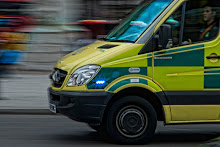Two things I would like to discuss:
One: Alternatives. In the area where I work there aren't too many. A lot of GP clinics don't take new patients, the standard of treatment can be very average. At night time, getting hold of a GP is even trickier, heading towards impossible. Out of hospital services (hospital at home, nurse practitioners) are just in their infancy and not widely spread. Paramedic practitioners do not exist, and judging by the current environment it may be quite some time until they do arrive (if at all).
Point being: a lot of the times people don't know where to turn to, so they just call an ambulance. You might be their only choice.
Two: Due to the above, it has become a mindset to call an ambulance. Not only for transport, but for advice on the current situation. Unfortunately, not much of our training is directed towards advice, neither are our guidelines. (You come? Hop on! You stay? Sign here!)
BUT - This is the very situation where we have the chance to change things and show the public that we a professionals, and not mere transport monkeys.
That 13year old girl with 'DIB/SOB' (difficulty in breathing, shortness of breath) due to a massive asthma attack who gets a lights and sirens response? Yep, on arrival she has a cold, nothing more, but thats part of the job. Sure, her mum may have exaggerated over the phone to get us there quicker, she also may have unintentionally said all the right keywords (AMPDS or not). Either way both of them should be told (not told off) when to dial 000/112/999/911, and when not. The next time they don't call you at 3am for a manflu you may not know it, but you or a colleague will be thankful for one call less that night...
I know there is no easy fix. There will always be people who will call an ambulance for the most minor of ailments, no matter how much you
So, what can we do? We should familiarise ourselves with alternative healthcare pathways, pass on this information to patients who may potentially benefit from such and encourage them to use them - appropriately. Talk to the staff at your local hospital what they might know, and find out what they tell people who self present to ED. Browse the net, especially the government websites (aged & disability care), additionally any private healthcare providers who may work closely with the government to provide a service.
- ~ -
Feedback please! Let me know how you deal with such situations, what alternative pathways you have, and any improvements (both ambulance and hospital) that have been implemented in your area.
P.S.: Thanks to Ross Hendry (twitter: @ross71521) for pointing out that The Happy Medic wrote a similarly themed blog post recently: http://bit.ly/cwHIUc
P.S.: Thanks to Ross Hendry (twitter: @ross71521) for pointing out that The Happy Medic wrote a similarly themed blog post recently: http://bit.ly/cwHIUc


